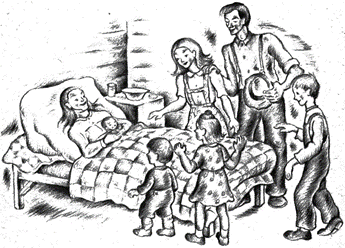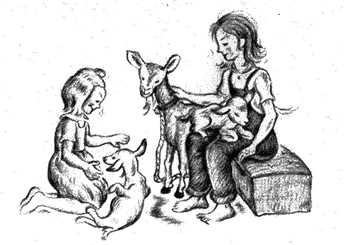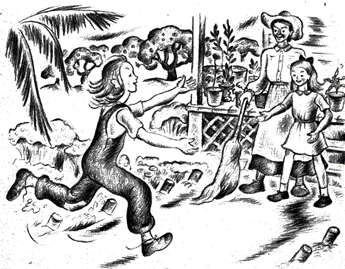Judy's Journey (22 page)
Authors: Lois Lenski


And then Judy saw the HollowaysâTessie and Gwyn and their baby and their parents. She would have known Tessie anywhere. The next minute she was in Tessie's arms, and everybody was talking at once. The Holloways had been working for another New Jersey grower, but had come to the Simpson Company and had now moved into an apartment at the other end of the same dormitory. The Holloways were to be neighbors again.
After that, Tessie and Gwyn went on the same bus to school every morning, and were in the same class with the Drummond children.
Judy told all the children at school about the new baby, and one day Miss Billings brought a group of them out to see her. She brought Miiko from California and Ramon from Mexico and Coreena May from South Carolina and Rosa Maria from Philadelphia and Charles from Texas and Shirley from West Virginia and Jeanette from Tennessee.
As Mama grew stronger, she found that working in the plant were people of different races and from different localities in this country. A group of women came to see her and brought a complete outfit of clothes and bedding for the new baby. It made Mama so happy she cried. Nothing like this had ever happened to her before. She was surprised to learn that she had so many friends.
One Saturday afternoon, Judy went to town with Papa. After doing their shopping, Papa took Judy to a carnival being held in the baseball park and bought her a double ice-cream cone. They looked at the bingo counters, shooting galleries and wheels of chance, then had a ride on the Ferris wheel. When they got off, there in front of them they saw a tent with the sign:
MADAME ROSIEâPALM READINGSâSPEAKS SEVEN LANGUAGES,
and there was Madame Rosie herself. She grabbed hold of Papa's arm.
“You made any money, mister?” she demanded. “You gettin' that house for this little girl? You been feedin' her up a little better?”
Papa explained about his good job and the new second-hand car he was going to get to take the place of the jalopy.
“Don't spend your money on a car, save it for that house,” said the fortune-teller.
“Maybe I better,” said Papa thoughtfully.
“Did I stiffen your backbone for you?” asked Madame Rosie, laughing.
“You shore did,” laughed Papa. “You near about scared the life outa me. But
why
?”
“I'll tell you a secret,” said Madame Rosie. “I was afraid Judy's fortune would never come true. We fortune-tellers just say nice things to peopleâwhatever they want to hear. Sometimes maybe it helps 'em, I don't know. Sometimes we just say anything to get their moneyâwe got to live, too. I just wanted your girl to have a decent home to live in. I wanted it for her, bad, so I tried toââ”
“You helped,” said Papa. “We're startin' to Florida soon, and we're aimin' to git us a farm and a house.”
“And a mule and a cow and a cat,” added Judy. “Joe Bob's got his dog.”
Madame Rosie said, “Wait a minute,” and disappeared inside her tent. When she came out, she brought a string of bright blue glass beadsâthe same color as Pinky Jenkins' blue bottleâand dropped them around Judy's neck. Then she bent down and kissed her on each cheek.
“Good luck!” she said softly. “And everything that goes with itâhealth, happiness and prosperity.”
“What a woman!” said Papa, as they walked away. “A mountain of a woman.”
“She was the first friend I made after I left Plumtree Creek,” said Judy.
“And a real one too,” said Papa.
The tomato and lima bean season lasted well into October, but it was November before the doctor said Mama was strong enough to travel. Papa decided to take Madame Rosie's advice and not spend money on another car, because he would need a truck in Florida if he bought a farm. He got out the old jalopy and began to collect new “parts” for it, to get it in shape for the long trip south.
“The ducks are going,” laughed Papa. “Time for us to start.”
“But Papa,” said Joe Bob, “I haven't seen snow. I thought we came
up north to see snow
.”
“Oh Papa,” cried Judy, “I'm finishing the Fourth Reader. Soon I can go into the regular Fifth Grade, Miss Billings says. How can I leave Rosa Maria and Tessie and Shirley and Miiko and Coreena May?”
“You-all jest want to stay
up north and be Yankees
, I see that!” teased Papa.
All the neighbors in the dormitory came in the night before the Drummonds left. They visited and talked and played games, and there were refreshments for all.
The next morning Papa routed the family out early. It was just daylight and the sky looked dark and heavy when they climbed into the old jalopy. Joe Bob brought Barney on a leash and Papa went to bring Missy from her shed in the yard behind the dormitory.
“Looky here,” he called out. “We've got two extra passengers to take along with us.”
The children went around behind the car. There stood two wobbly kids, one black and one white. Missy was bleating proudly as she nuzzled them. Papa loaded them carefully into the trailer.
“Oh Papa! Two little baby goats!” cried Judy. “I must take them to school to show to our class. Charles brought his baby alligator and Rosa Maria brought her kitten and Ramon his pet rabbit ⦔
“You can take 'em to school in Florida, honey,” said Papa, climbing into the front seat. “We're off just in time. Look!”
The air was suddenly filled with a flurry of white. Judy and Joe Bob danced about, their hands uplifted to the sky.
“
Snow
!” they cried happily. “
Snow
!”

Journey's End
“O
H
P
APA, DO WE
have to stand up to ride?” inquired Judy.
“No, sugarpie, no,” said Papa. “You've done all the truck-standin' and truck-fallin' you're goin' to do. The man's giving us an old auto seat to put in the back for you young uns to ride on. Lonnie and the baby will stay in front with Mama and me.”
They had started out in the old jalopy, but got only as far as Stony Creek, Virginia, when the car broke down. Papa went to a second-hand auto place, turned it in and bought a secondhand truck. The two-wheeled trailer, now on its last legs, was abandoned, and the goats were put into the truck. There wasn't much furniture left. The bureau, table, bed and sewing-machine had gone long ago. Only the kerosene stove, the tent, the mattress and quilts, and cartons of clothing and cooking utensils remained.
It was fun riding on the auto seat in the back of the truck. Joe Bob held Barney and the two girls played with the baby goats.
One night in South Carolina it was chilly and cold, so they stopped at a Tourist Camp instead of putting up the tent. They took two cabins and all slept in beds. The manager had a restaurant by the roadside and they ate breakfast there. While they ate, he stood by their table and told Papa how he planned to improve and expand his Tourist Camp.
“I'm junking all these cabins I got now,” he said, “and rebuilding. The new cabins will be DeLuxeâthe last word in roadside comfortâheat, light, Beauty-Sleep mattresses, hot and cold showers, everything.”
“Junkin' all these cabins, eh?” asked Papa.
“We had a big wind last week,” said the manager, “and one of 'em blew over. They're not made so goodâthey were just temporary, till I built up my trade.”
Papa got up from the breakfast table and went outside with the man. Mama and the children waited a long time for him to come back. When he did, his face was beaming.
“We're goin' to stay here another night and sleep in beds again,” he said, “free of charge. The young uns can play around and Calla, you and the baby can get a good rest.”
“Why, Papa, why?” cried Judy and the children. “I've got us a house,” said Papa.
“A house? A house!” The children all shouted at once with the wonder of the news. Mama smiled quietly. Even the baby cooed.
“You're teasing, Papa,” said Joe Bob.
“Has it got a floor and four walls and a roof to keep the rain off?” asked Judy.
“Has it got windows and a door and a chimney?” asked Joe Bob.
“All but the chimney,” said Papa, chuckling.
“Where did you get it, Papa?” asked Joe Bob.
“Are we going to stay here and live in it?” asked Judy.
“No,” said Papa. “It'll be a house-on-wheels, somethin' like the Darnells' house-trailer. I've bought that cabin that blew over. The manager sold it to me for a song.”

Papa worked all that day and part of the next. With the manager's help, the tourist cabin was mounted on the body of the truck and made secure. It had a window on one side and a window and door on the other. Papa built folding steps for the door and a porch in back for the goats. He built platforms inside the cabin for sleeping-bunks. Mama and Judy moved the stove and other things in. In front of the door they put the piece of Brussels carpet with roses on it.
“Still as good as new,” said Mama happily. “It shows what good quality it was, a dollar sixty-nine a yard.”
“It makes it feel like home,” said Judy, “just to see that carpet on the floor.”
“Now we can go anywhere,” said Joe Bob, “and take our house with us.”
“I'll make some curtains for the windows,” said Judy.
They stopped at the next town and bought four yards of pretty red-checked gingham for curtains, and Mama bought a clothes basket for a bed for the baby.
It seemed good to get back into Florida again where the shiny-leaved citrus groves lined the roadsides. After cold nights on the way, it was good to be warm again. Like that first time when they came from Alabama, Florida seemed like Heaven, and Judy didn't bother about the names of the towns they passed through. So when Papa drove up in front of a two-story farmhouse with a verandah on three sides and huge trees shading it, she was taken by surprise.
It was the Gibsons' place.
It looked just the same. The yard was full of blooming flowers and the verandah was full of blooming house-plants. Mrs. Gibson and Mary John were coming down the path with outstretched hands. Behind them came Mr. Gibson, on his feet again but limping a little. And after a while, Ollie Peters appeared, as jovial and good-natured as ever, and shook hands all round.
It was like coming home.
